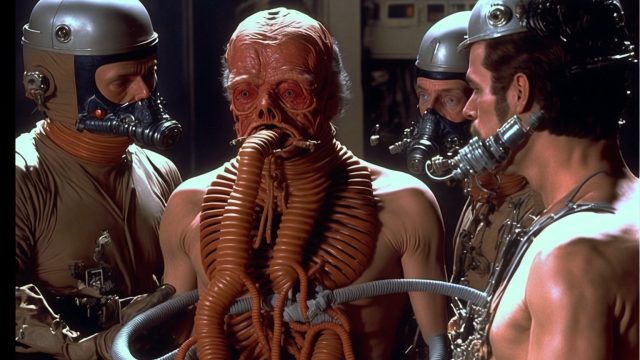This Week You Will Be Made Obsolete By:
- artificial intelligence
- updated language
- the next generation of celebs
- traditional notions of child-rearing
- gastronomic trends!
Thanks to the eternally up-to-date scb0212 for contributing this week. Send articles throughout the next week to ploughmanplods[at] gmail, post articles from the past week below for discussion and Have a Happy Friday!
The thing is, there is no such movie — [Keith] Schoefield created all the images using the AI tool Midjourney. Some people were fooled, since Schofield didn’t immediately reveal the images were made using artificial intelligence, and others were just plain angry that he had taken the legendary Cronenberg’s name in vain. […] “We’ve started to see this technology as something like a dream engine,” [Rob] Sheridan said, “tapping into a kind of warped visual consciousness to explore things that never were, or never will be, or never could be. They hit you in a strange way, because they feel very plausible.”
Sheila O’Malley talks on the passing of Lisa Marie Presley and what she meant culturally and to her personally:
Lisa Marie existed in her own in-between territory, replete with the past, with eyes looking ahead, cracking open a space for us, her contemporaries. Speaking for my generation: She grew up alongside us, and she had an importance not easy to describe. I love Elvis but I have no nostalgia for him. I wasn’t there at the time of his rise. My parents didn’t have Elvis records in their collection. I came to him through watching Blue Hawaii on television when I was 10 or 11. I mean, I have no memory of it, it might have been Jailhouse Rock, but I’m sure it was something like that. He was just always there. Lisa Marie, though, was different. […] The children of Mythical Men were out there among us.
Ayesha A. Siddiqi discusses Lamb as a counter narrative to the usual depictions of parenthood on film:
Any domestic acts of care attached to enabling another person’s life, or own’s own, is typically depicted as the thankless, unpaid, gendered drudgery at the expense of those involved. No wonder “main character syndrome” has become a coping mechanism for a society with few models of relation. Care work is understood primarily in the context of burden, or presented as a cosplay through which right wing fantasies about women are realized. Not so with A24’s Icelandic farmhouse horror movie Lamb (2021) where a rural couple become parents to a child with the head of the title animal. Lamb is not concerned with asking or answering many questions about the half human-half sheep Ada; instead what it depicts in detail is Ada’s effect on the couple.
At Vox, Bryan Walsh talks on the closing of world-class Danish restaurant Noma and what it signals about the era of high class dining:
So what exactly do we want from haute cuisine? Is it to demonstrate that food can be not just good but better — better for us and the planet? Is it to show you can make perfect food with perfect service in the perfect environment, night after night, while treating each and every one of the many workers required to make that possible as fairly as possible? Or is to turn a restaurant into a canvas of creativity, a white space — or, in the case of Noma, cool Scandinavian gray and wood-tan — for an ambitious, driven chef to produce the best possible art they can? Pick one, because you can’t have them all.
Matthew Yglesias muses on social justice, John le Carré and who is served by inclusive language:
Language is arbitrary and always changing, so personally I find “getting mad at language change” to be one of the lowest forms of reactionary politics. At the same time, it’s worth just applying a little bit of common sense to the question of who is and isn’t included by saying “practicum” instead of “field.” Highly educated people and white-collar workers who spend a lot of time bored at the office staring at computer screens and reading articles are well positioned to have large and flexible vocabularies. We are used to learning new words and learning how to use them.

